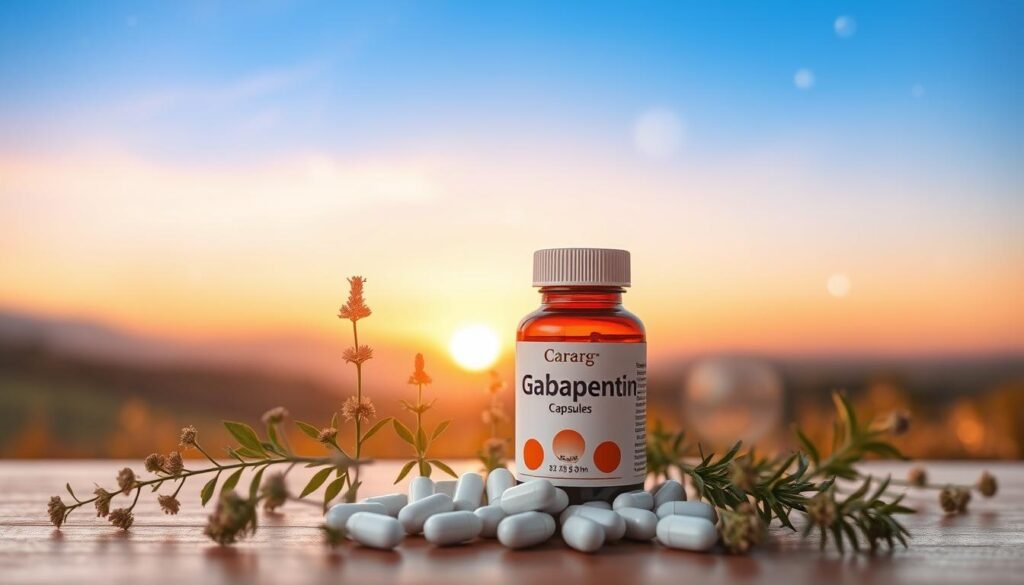Anxiety disorders impact around 40 million adults in the U.S. yearly. This is close to one in five people. It shows how important it is to find good treatments. Gabapentin, often used for nerve pain and seizures, is now seen as a hopeful option for anxiety. This guide will talk about using gabapentin for anxiety. Specifically, the gabapentin 100mg dosage for anxiety, its advantages, possible side effects, and how it compares to other anxiety medicines.
Key Takeaways
- Gabapentin is mainly given for lasting nerve pain and seizures.
- The typical dosage for gabapentin in treating anxiety ranges from 100 mg to 300 mg daily.
- Some common side effects of gabapentin for anxiety are dizziness, tiredness, and unsteadiness.
- Gabapentin’s off-label uses include treating generalized anxiety disorder and post-traumatic stress disorder.
- Compared to traditional anti-anxiety meds like benzodiazepines, gabapentin has a lower addiction risk.
Understanding Gabapentin and Its Uses
Gabapentin is also known as Neurontin. It is mainly used to prevent seizures. It helps by changing how nerve signals work in the brain. Besides controlling seizures, it’s known for treating pain. Importantly, it’s also used for anxiety when other treatments don’t work.
Doctors now commonly prescribe gabapentin for anxiety. It’s especially used for generalized anxiety disorder (GAD) and social anxiety disorder (SAD). Gabapentin works by affecting a brain chemical that helps calm the brain. This helps reduce anxiety.
Those who get gabapentin for anxiety may see better results when used with other treatments. For example, Cognitive Behavioral Therapy (CBT) can boost gabapentin’s effects. Combining them offers a greater chance of managing anxiety successfully.
Taking gabapentin has its risks too. Some people might feel dizzy, sleepy, or have vision changes. There are serious risks as well, like severe allergic reactions. If you’re taking other medicine, it’s vital to talk to a doctor. Gabapentin can increase certain risks when mixed with other drugs.
Before starting gabapentin, talking to a healthcare professional is crucial. You can learn more about its side effects and how to use it properly here. Getting all the facts helps patients and doctors make the best treatment choices.
What is Gabapentin?
Gabapentin is a drug used to treat epilepsy and neuropathic pain. It’s also gaining attention for anxiety management. By mimicking gamma-aminobutyric acid (GABA), it can reduce abnormal brain activity. This activity is often linked with anxiety disorders.
The drug comes in doses of 100mg, 300mg, or 400mg in capsules. Tablets may have 600mg or 800mg. For those 12 and older, the typical epilepsy dose ranges from 900mg to 3,600mg daily. This is split into three doses. The same dosage is used for nerve pain management.
Studies show gabapentin may effectively reduce anxiety symptoms. It’s crucial to know how to use it and understand its side effects. Side effects include dizziness and drowsiness. Doctors advise adjusting the dose slowly to stop treatment safely. While not the first choice for anxiety, gabapentin is used with other treatments for better results.
gabapentin 100mg dosage for anxiety
Gabapentin is known for its ability to calm anxiety. The gabapentin 100mg dosage is where many start their treatment. It helps lessen anxiety with few side effects. Knowing how gabapentin works can show why it’s useful for those with anxiety issues.
Typical Dosage Range
The usual starting dose for anxiety is 300 mg in the evening. The dose can vary from 900 mg to 2,400 mg daily. It’s split into three doses. For some, the dose can go up to 3,600 mg daily, combined with other treatments like CBT. Here’s a table showing dosages for different conditions:
| Condition | Starting Dosage | Typical Dosage Range | Maximum Dosage |
|---|---|---|---|
| Anxiety | 300 mg in the evening | 900 – 2,400 mg/day | 3,600 mg/day |
| Depression | Varies | 900 – 2,000 mg/day | Varies |
| Epilepsy | Varies | 900 – 3,600 mg/day | Varies |
How it Works for Anxiety
The gabapentin mechanism for anxiety stops some nerve signals that cause anxiety. It changes brain chemicals to calm the mind. Many feel better in a week. Using it with other treatments improves results. This means a better approach to handling anxiety disorders.

Gabapentin for Anxiety Treatment
Gabapentin is being recognized for its ability to treat anxiety disorders effectively. It offers several benefits over traditional methods. Those seeking anxiety solutions can find value in understanding these advantages.
Benefits of Gabapentin for Anxiety
Its major benefit is a lower addiction risk compared to benzodiazepines, known for dependency issues. Benzodiazepines like Xanax offer quick relief but are prone to abuse. Gabapentin acts like the calming neurotransmitter GABA, serving as a safer long-term option.
It also aids those with nerve pain and anxiety. This dual-action can significantly enhance life quality. For those unaided by standard treatments, gabapentin emerges as a hopeful alternative.
Comparing Gabapentin with Other Anti-Anxiety Medications
In comparing gabapentin vs benzodiazepines, we find different profiles. Traditional anxiety drugs act fast but risk dependency, demanding constant watch. Gabapentin takes about three weeks to work, requiring thoughtfulness in its use based on personal needs and health history.
Below you’ll find a comparison table showing how gabapentin differs from other anxiety meds:
| Medication Type | Onset of Action | Risk of Addiction | Common Side Effects |
|---|---|---|---|
| Gabapentin | 3 weeks | Low | Dizziness, drowsiness, nausea |
| Benzodiazepines | Immediate | High | Dependence, sedation, fatigue |
| SSRIs | 4-6 weeks | Low | Weight gain, sexual dysfunction |
Choosing a treatment relies on the individual’s situation. Seeing healthcare professionals can offer more insight. If you need help with gabapentin for anxiety treatment or other methods, resources are available.

Gabapentin Off-Label Use for Anxiety
Gabapentin is getting noticed for treating anxiety in ways not officially approved. It’s mainly for stopping seizures and easing nerve pain. But, it might help with anxiety and PTSD symptoms too. Some studies find it can change behavior by lowering anxiety.
When using gabapentin for anxiety, people usually start with 300 mg daily at night. Depending on how they respond, the dose may go up. Some might need up to 3,600 mg every day. This is the highest dose approved by the FDA. How quickly it works varies. Some feel better in a week, others take longer. Often, doctors prescribe it with SSRIs to tackle anxiety and depression effectively.
Research shows taking medicine with Cognitive Behavioral Therapy works better. It improves chances of getting better by 60% compared to just one method. But there’s a worry about people misusing gabapentin. So, if you’ve had issues with substance misuse, be extra careful. Working closely with your healthcare provider is key. They ensure the treatment is both safe and effective.

Understanding Anxiety Disorders Treated by Gabapentin
Anxiety disorders can deeply affect people’s daily lives. Gabapentin has become a hopeful treatment for these conditions. It is particularly helpful for generalized anxiety disorder (GAD) and social anxiety disorder (SAD).
Generalized Anxiety Disorder (GAD)
About 3.1% of people in the U.S. have GAD. They worry too much about different things. This makes focusing hard and causes a lot of stress.
Gabapentin could help calm the brain, which eases symptoms of GAD. It helps people manage stress better every day.
Social Anxiety Disorder
People with social anxiety are very afraid of being around others. This fear makes them avoid social gatherings. But gabapentin offers hope by lessening their anxiety in these situations.
Research shows it can help people feel less scared and uncomfortable in social settings. This lets them interact with others more easily.
Gabapentin Dosing for Anxiety Management
Knowing the right dose of gabapentin for anxiety is key. Doctors often start with 100 mg to 300 mg a day. This helps see how you react to the medicine and keeps side effects low.
Starting Dosage Recommendations
Begin with a small dose of 100 mg, increasing slowly as needed. Doses usually go up by 100 mg. This method allows for care that fits each person’s needs.
Gradual Dosage Adjustment Process
After starting treatment, your doctor may change the dose for better results or fewer side effects. For anxiety, higher doses of 900 mg or more are often needed. Lower doses might not relieve the anxiety well enough.
Gabapentin and Anxiety Side Effects
Gabapentin treats seizures and nerve pain but is also used for anxiety. While it helps, we must know the side effects. Knowing side effects helps users manage their treatment better.
Common Side Effects
When starting gabapentin, patients may notice some side effects. These include:
- Dizziness
- Fatigue
- Blurred vision
- Tremors
- Unsteadiness
- Involuntary eye movement
- Change in libido
- Agitation
Often, these symptoms lessen over time. Always talk to a doctor if they don’t improve or get worse.
Managing Side Effects Effectively
Adjusting the dose of gabapentin can reduce side effects. The starting dose for anxiety is about 300 mg daily. The highest dose approved is 3,600 mg per day. Raising the dose slowly can ease side effects and improve benefits.
Using cognitive behavioral therapy (CBT) with gabapentin can also help. CBT is great for dealing with anxiety. It can make treatment 60% more effective.
Joining support groups or forums is another good idea. It offers tips for handling side effects, shares knowledge, and creates community.
| Side Effect | Description |
|---|---|
| Dizziness | A feeling of spinning or losing balance. |
| Fatigue | Feeling very tired, sleep doesn’t help. |
| Blurred Vision | Vision isn’t clear, making daily tasks hard. |
| Tremors | Shaking or trembling that you can’t control. |
Understanding gabapentin’s side effects can help people choose the best anxiety treatment. Checking in with a doctor helps adjust treatment as needed. This way, people can feel better and focus on improving their mental health.
Patient Experiences: Gabapentin Anxiety Forum and Reddit Insights
Patients often talk about their gabapentin experiences on Reddit and other health forums. They share stories, which give us a peek into gabapentin’s effect on anxiety disorders. These stories cover everything from starting doses to how they had to adjust over time.
Real-Life Testimonials
How gabapentin works can vary a lot from person to person. Some start with a small dose and go up from there. Others talk about side effects they’ve had to deal with. One person started with 300 mg but stopped because the side effects were too strong. They later shared more about their highs and lows with gabapentin, showing why support from others is key.
Helpful Discussions on Online Platforms
In online groups and on Reddit, people share advice on handling side effects and finding the right dose. These tips aim to make treatment easier and more effective. These online groups are a big help for anyone starting gabapentin, offering insights and encouragement when needed most.